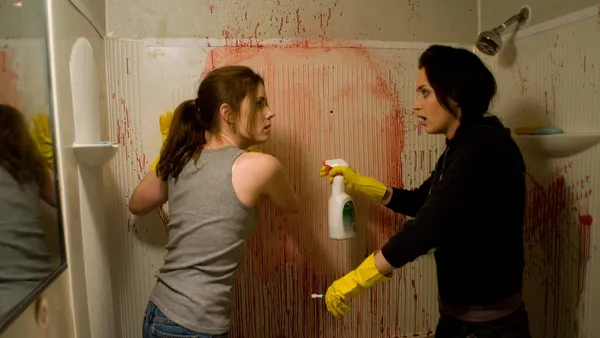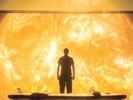Eye For Film >> Movies >> Sunshine (2007) Film Review

Fifty years into the future, our sun is starting to die out. But there is hope: by combining the resources of everyone on Earth, a spacecraft is sent to re-ignite the star by detonating a massive stellar bomb at its centre. After the failure of a previous mission, the crew of the Icarus II are the last and only chance to save humanity. That’s the brilliant premise to Danny Boyle and Alex Garland’s latest film, and from there on in, it just gets better.
While it may sound like it, this is no Armageddon or The Core. Sunshine has a lot more in common with such intelligent sci-fi as 2001: A Space Odyssey or Solaris, but with the added tension and claustrophobia of Alien. We are as trapped in this small, confined spacecraft as the eight astronauts are, hurtling towards the sun; their only protection a massive heat shield that deflects away the sun’s rays whilst enveloping the ship itself in near darkness. Sixteen months into the mission, everything has so far gone to plan, but while passing Mercury the crew pick up a distress beacon. Could the signal be from the missing Icarus I, which disappeared seven years earlier whilst attempting to complete the same mission?

Making a film like Sunshine without the influence of well-known classics of the genre would be impossible, so the presence of a few sci-fi clichés (such as the distress signal) is forgivable. How these elements are handled and given a fresh breath of life by Garland’s script is just one reason for the film’s pull. Another is Boyle’s stunning direction, particularly the hypnotic movement of the Icarus II as it glides through space, the claustrophobic interior shots of the spacecraft and the jarring visuals of the later scenes.
Overall, the film looks fantastic. The special-effects work, which took a year of post-production to complete, wouldn’t look out of place in a movie with ten times the budget. Alwin Kuchler’s dramatic cinematography, like much of the story itself, is defined by the extremes of light and darkness. Even when the sun is not on screen, its presence is still felt in every frame; its absence just as powerful as its dazzling glare.
Cillian Murphy (28 Days Later) in the lead role is quietly effective with just the right amount of arrogance, while the rest of the cast provide sound support. Notably, Chris Evans (Fantastic Four) offers some realism as the ship’s engineer, saying exactly what the audience are thinking when the rest of the crew choose to divert the mission. Their journey towards the sun is as much a psychological journey as a literal one, and the script asks some fascinating questions of the characters. Most interestingly, it offers a variation on the classic moral dilemma of whether allowing one person to die is acceptable in order to save a number of others. It is this philosophical quality that raises Sunshine above the level of most recent sci-fi movies; providing genuine food for thought and sure to provoke plenty of discussion.
Reviewed on: 22 Mar 2007



















